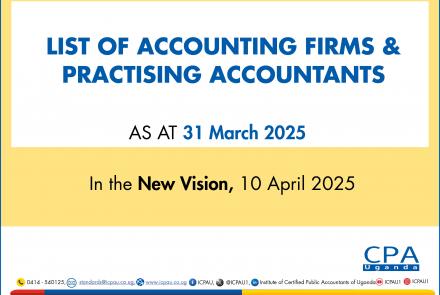By Abaasa Joan Abaasa
Communications Officer -ICPAU
CPA Silajji Kanyesigye Baguma, Team Leader at RKA & Company, presented on the Impact of Tax Policies and Practices on Domestic Revenue Mobilisation at the 12th Economic Forum held at Imperial Resort Beach Entebbe. During his presentation, he stressed that tax policies should be structured within Uganda’s strategic direction, focusing on high-impact interventions, Comprehensive Financial Reports (CFR), DRM strategies, and fiscal consolidation.
CPA Baguma began by providing the background of Domestic Revenue Mobilisation (DRM), which originated from the Addis Tax Initiative (ATI) in 2015. He explained that the primary goal of the ATI is to promote fair and effective DRM, policy coherence, and the social contract through partnerships and knowledge building. Additionally, he noted that DRM is the process by which countries raise and spend their funds for public goods and services hence reducing dependence on foreign aid.
He described the distinctions between tax policy and tax practice, defining tax policies as the guidelines and principles established by a government for the imposition and collection of taxes, encompassing both microeconomic and macroeconomic aspects
CPA Baguma addressed various tax drivers, challenges, good practices, and recommendations within the realms of tax policy, tax practices, and DRM. He stressed the importance of synchronising policy intentions with tax practices to avoid unintended impacts, such as discriminatory measures and increased costs of doing business.
He urged the government to promptly pay domestic arrears and reduce its overcrowding of the private sector in accessing finance. He also highlighted the need to reduce informality and ensure tax policies are cognisant of Uganda’s economic structure, whether credit or cash-based, and whether focused on consumption or investment.
“Good practices in developing tax policies include increasing the role of Ministries, Departments, and Agencies in complementing revenue mobilisation through collaboration,” he stated.
CPA Baguma advocated for synchronisation and uniformity in taxpayers' data using standard identification numbers. He recommended reviewing selective policies that favor a few economic players while limiting others, looking at the bigger picture, and ensuring research-based policies are in place. Furthermore, he recommended that publishing tax policy explanatory notes is critical to ensuring correct interpretation and compliance, which would improve voluntary tax compliance and reduce disputes.
CPA Baguma emphasised the need to invest in tax administration capacity building to improve compliance and enforcement. He also highlighted the importance of increasing taxpayer engagement to ensure certainty in exchange for transparency, thereby minimising ambiguity, incidences of corruption, and costly tax disputes.
For the DRM improvement action plan, He recommended investing in applied research to avoid unintended consequences and customising benchmarks, engaging taxpayers during research to appreciate business operations, and aligning policies.
He concluded by emphasising the role of complementary MDAs in regulating to improve service quality and DRM across various sectors. He also highlighted the importance of prudent tax policies and administrative measures for businesses and households in widening the tax base and fostering national development.



